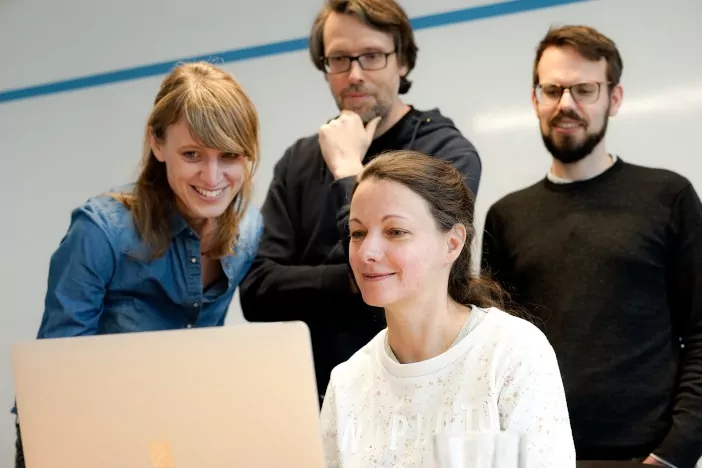The one big challenge in product development is that there are always so many ideas and so little time! Or so they say. The far bigger challenge is that we’re all humans, with our own ambitions, biases, strengths, egos, and flaws – all the things that make us our amazing and wonderful selves. At commercetools, we believe that no matter how well established your processes and methodologies are, you can only be successful if you set up your organization for people. Reflecting further on this, we have identified a few core principles flowing through our day-to-day work and we’d like to share them with you so they can guide your future steps in the big tech & product world.
Different from old school companies, where product and technology argue over sparse development time and roadmap space, we – Product Managers, UX and Tech – have a collaborative approach and use everyone’s skills and expertise to determine what brings the most value – for a MACH architecture product in a fast-growing company, tech, growth, UX, and features all contribute!
- The Product side brings the knowledge about customer value, user satisfaction, and market potential doubled down by the right methodologies to prioritize.
- Technology leadership has a deep understanding of the value that architectural, security, or technological advancement brings.
- Engineering leadership and agile coaches contribute with their knowledge of organizational design, process and tool improvements, plus give answers to the challenges of onboarding and motivating engineering teams.
The different skills, relevant experiences and motivations are the reason why on all levels of the organization, tech, product, engineering and agile coaches are better together – we need each other, and cannot succeed in isolation and silos.
Sometimes the topics we work on can be complicated. That’s why we have a group of internal experts and advisors. Principal Engineers consult on and drive technology or initiatives, Principal UX and Market Intelligence help on UX and product value topics, and Business & Leadership Coaches support and guide organizational change and leadership practices.
We listen to each other and to our own thoughts
Collaboration doesn’t stop at prioritizing. Feasibility and delivery are also a team effort. The team discusses whether they are set up for successful delivery, and commit to deliverables together and unanimously. The same is true for all important decisions, on all levels. Whether it’s about how we restructure our organization while growing, interviewing candidates for key positions, or deciding on ways of working within a team:
- CTO, CPO, Director of Tech Leadership, VP Product, and Head of Agile Coaches work together as equal peers on high level goals for the product & organization.
- Head of Products, Head of Engineering, Staff Engineers, and Lead Agile Coaches do the same thing on the product group level.
- Product Manager, Engineering Manager, and Agile Coach do the same thing on the team level.
It isn’t easy to speak up and share a point of view that’s different from what others said. We work on giving people an environment of trust and blamelessness, and actively encourage dissenting opinions. Not only does it make discussions more interesting, it also helps us to not get stuck in an echo chamber, where the most prominent idea gets reinforced, and never challenged. A good conversation is one where everybody walks away with a new perspective.
We don’t hide
For commercetools, the product is front and center. There are a lot of colleagues who rely on us to deliver not only a product but also transparency about where we are, what we’re up to next, and why sometimes not everything is running perfectly. We have many ways to do this, from real quick status meetings to product demos and retrospectives.
This transparency is only possible because there is no need to hide even uncomfortable truths. We know that all teams want to do good, and when things don’t go as planned, everybody chimes in to help and remove roadblocks. We have each other’s backs, regardless of reporting lines or which team someone is on. This leads to being rewarded when you share that you have a problem instead of being punished, and reinforces the behavior to share openly and often. And that’s super useful to everyone in the company.
In post mortems (those are retrospectives we do whenever something bad happens, for example a bug on production) we are just as open and transparent. The goal here is not to identify opportunities for help, but to learn through reflection, and aim to get better, as a team.
We’re better together
There’s this concept in architecture referring to all hallways, corridors, and in-between spaces as liminal spaces (from the Latin word „limen,“ which means threshold), which has found its way into the business world. It emphasizes the need for building in-between (metaphorical) spaces that can connect the past and the future, the familiar and the different, the old way of doing things and a new one. We have found our liminal spaces, our daily thresholds we deliberately cross so we can be and work better together.
- Interconnectedness. We are the sum of all parts, and while each part – Product, UX, Internal Experts, Tech – has a well-defined area of practice and impact, we are stronger, wiser, nimbler when we unite our domains, minds, and hearts and work together.
- One big project, many voices. We actively listen to each other and ensure everyone has the time and space to express themselves. We avoid echo chambers and aim to elevate our perspectives and mental images.
- Transparency over hiding. We have created a safe space where the hard truth and the uncomfortable facts can be shared with candor. We don’t hide, we reflect. We don’t keep it to ourselves, we speak up.

ANDREA TALKS ABOUT COMMERCETOOLS
„We are a leader in modern enterprise ecommerce solutions. Our flexible and fast commerce platform is built on modern architecture principles and open source technologies: Microservices, API- first, Cloud Native and Headless – we created the MACH approach. Together, our team supports an array of customers and partners, many of which are Fortune Global 500 companies. Established in Germany in 2010, commercetools is now a global unicorn powered by people-driven innovation and valued at 1.9 billion EUR.
- 400+ employees
- 40+ nationalities
- 34+ languages
- 9 international offices
More articles and interviews from the retail section can be found here.
